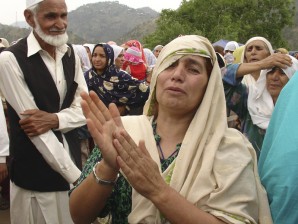Suicide truck bomb kills at least 26 in Pakistan

A Pakistani woman mourns the death of her family member, during his funeral in Mansehra, Pakistan on Thursday, May 26, 2011. A suicide bomber in an explosives-laden pickup truck leveled a police building in northwest Pakistan Wednesday, killing five officers and wounding 30 other people in the latest attack to rattle the country since the U.S. raid that killed Osama bin Laden. (AP Photo/Aqeel Ahmed)
PESHAWAR, Pakistan— A suicide bomber in a pickup truck detonated his explosives near several government offices in northwest Pakistan on Thursday, killing at least 26 people, in the latest violence to hit the country since the U.S. raid that killed Osama bin Laden.
The Pakistani Taliban claimed responsibility for the attack. Its devastation was likely to add to criticism of the government, already under fire over the unilateral U.S. operation to kill the al-Qaida chief and the mounting bloodshed since.
Hangu is located just outside Pakistan’s lawless tribal regions bordering Afghanistan. The tribal areas have long been havens for al-Qaida and other militants, including Pakistani Taliban fighters, who oppose the Pakistani government because of its alliance with the United States.
The bomb went off near several government buildings, including the district commissioner’s office. Those buildings for the most part escaped the blast, officials said, but many shops and other structures nearby were damaged.
At least 26 people were killed and 56 were wounded, officials said. Most of the victims were civilians, including many in a nearby restaurant. Around 900 pounds (400 kilograms) of explosives were used, said Masood Afridi, a high-ranking police official.
Article continues after this advertisementThe May 2 U.S. raid that killed bin Laden damaged the Pakistani government and military’s reputation, with many Pakistanis asking how bin Laden could have hidden in an army town, and how the Americans managed to enter the country, carry out the raid and leave Pakistani airspace without being detected.
Article continues after this advertisementSince the raid, Pakistani Taliban militants have claimed responsibility for several major attacks in Pakistan, including an extraordinary 18-hour siege of a naval base that killed 10 people, saying they were retaliating for the bin Laden killing. The attacks have further embarrassed the government and the country’s powerful security establishment.
In claiming Thursday’s attack, however, the militant group told The Associated Press that it was not vengeance for bin Laden, but rather revenge for security forces’ killings of a family of five Chechens earlier this month in Baluchistan province.
The Chechens — a husband, his pregnant wife, and their three children, apparently unarmed — were traveling toward Quetta city when they encountered a checkpoint on May 17. For unclear reasons, security forces fired on them. At first officials claimed the five were suicide bombers, but video from the scene undercut that claim, and the government has since launched an inquiry into what happened.
Pakistani Taliban spokesman Ahsanullah Ahsan did not explain why his group would kill numerous Pakistanis to avenge those he called “innocent foreigners.” But the attack suggested the militants were trying to exploit public outrage over the Chechens’ killings and general frustration with Pakistani authorities.
Earlier Thursday, Pakistani Prime Minister Yousuf Raza Gilani said Pakistan would use “all appropriate means” to attack militant hideouts on its soil, but he gave no indication the army was considering new offensives against insurgents along the Afghan border.
The United States wants to see action in North Waziristan tribal region especially, where a deadly Afghan Taliban faction is based, to help it put pressure on Afghan insurgents and enable it to begin withdrawing troops later this summer after 10 years of war.
In Paris on Thursday, U.S. Secretary of State Hillary Rodham Clinton acknowledged that the two governments had differences in the fight against Islamist extremists, but said it’s in America’s long-term security interest to keep trying to strengthen the relationship with Islamabad.
“There have been times when we wanted to push harder, and for various reasons they have not,” Clinton said. “Those differences are real. They will continue.”
She added strong praise for Pakistani cooperation since the Sept. 11, 2001 attacks, saying that the country had allowed the killing of “more terrorists than anyplace else in the world.”
__
Associated Press writers Rasool Dawar in Dera Ismail Khan, Anne Gearan in Paris, and Zarar Khan in Islamabad contributed to this report.